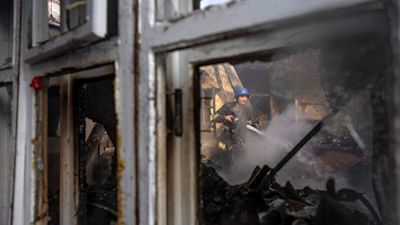Western leaders urge caution as Russia claims it will reduce military activity outside Kyiv

From his post in Ukraine, Correspondent John Ray reports on the day's developments
Western leaders have called for caution over Russia's claim that it will "fundamentally cut back" operations outside the Ukrainian capital of Kyiv.
“We will judge Putin and his regime by his actions, not by his words,” a spokesperson for Boris Johnson said.
While the British Ministry of Defence said Russia's stated focus on the separatist regions in eastern Ukraine “is likely a tacit admission that it is struggling to sustain more than one significant axis of advance.”
Separately, Joe Biden said: "I don’t read anything into it until I see what their actions are", while US Secretary of State Antony Blinken said there was a difference between what Russia says and does.
Fears were raised that the announcement may have been an attempt by Moscow to buy time to continue its assault, with Western officials believing the Kremlin is reinforcing troops in the Donbas region in a bid to encircle Ukraine’s forces.
The concerns are given credence as Moscow's deadly siege in the south continues, with civilians trapped in the ruins of Mariupol and other bombarded cities.
“There is what Russia says and there is what Russia does, and we’re focused on the latter,” Mr Blinken said during a diplomatic visit to Morocco.
“And what Russia is doing is the continued brutalisation of Ukraine.”
Pentagon spokesman John Kirby said the US has detected small numbers of Russian ground forces moving away from the Kyiv area, but it appeared to be a repositioning of forces, "not a real withdrawal."
Russia’s deputy defence minister Alexander Fomin had said Russian forces would reduce “military activity in the direction of Kyiv and Chernihiv" in what appeared to be the first major concession the Russians made since the beginning of their invasion in Ukraine more than a month ago.
Though the pledge has been made - it's yet to be seen if it will materialise on the ground.
Negotiators met face-to-face in Istanbul on Tuesday after several rounds of failed talks.
John Ray assesses how significant this set of talks has been
The Ukrainian delegation laid out a possible framework for a future peace deal based on legally binding security guarantees which mean other countries would intervene if it was attacked in the future.
They said Ukraine is prepared to pledge to be neutral, not to host foreign military forces and to hold talks over the next 15 years on the future of the Crimean Peninsula, which Russia annexed in 2014.
Delegate David Arakhamia said a peace deal would be secured by a referendum in Ukraine, which would only be held after all foreign troops had left.
Ukrainian President Volodymyr Zelenskyy has stressed that Ukraine needs security guarantees of its own as part of any deal, but has said his country is prepared to declare its neutrality, as Moscow has demanded.
Although Russia’s views on the proposal were not immediately clear, the talks have widely been seen as the most significant diplomatic moment since the invasion begin.
But despite promising rhetoric, attacks against Ukrainian infrastructure continued on Tuesday.
Mr Zelenskyy claimed that seven people were killed and 22 left injured after a missile strike on the regional government headquarters in the southern city of Mykolayiv.
The Ukrainian president, who spoke to the Danish parliament through a translator, told legislators that “the brutality is more violent than what we have seen during World War II".
Amid the continuing violence, the Dutch government has announced that it is expelling 17 Russian intelligence officers, calling their presence a “threat to national security.”
The foreign ministry said that the Russian ambassador was summoned on Tuesday and told the officers, who were accredited as diplomats, are to be removed from the country on national security grounds.
The government said it took the decision in consultation with “a number of like-minded countries,” citing similar expulsions by the US, Poland, Bulgaria, Slovakia, Estonia, Latvia, Lithuania and Montenegro.
Belgium has also reportedly expelled 21 Russian diplomats for alleged spying and posing threats to security, while Ireland has asked four to leave, saying their behaviour was not in line with what would be expected from diplomats.
In recent days, Russia’s troops have been struggling to make major advances.
Ukrainian forces retook Irpin, northwest of Kyiv, from Russian troops, who were regrouping to take the area back, Mr Zelenskyy said late on Monday as he sought to rally the country.
“We still have to fight, we have to endure,” Mr Zelenskyy said in a video address to the nation.
“We can’t express our emotions now. We can’t raise expectations, simply so that we don’t burn out.”
As fighting raged throughout the country, the mayor of Irpin, which has been the scene of some of the heaviest fighting, said the city had been “liberated” from Russian forces.
A senior US defence official said the US believes the Ukrainians have also retaken the town of Trostyanets, south of Sumy, in the east.
The official said Russia appeared to be de-emphasising ground operations near Kyiv and concentrating more on the Donbas region, the predominantly Russian-speaking region in the country's east where Moscow-backed rebels have been waging a separatist war for eight years.
For expert analysis of this topic, listen to the Ukraine episodes of the What You Need To Know podcast